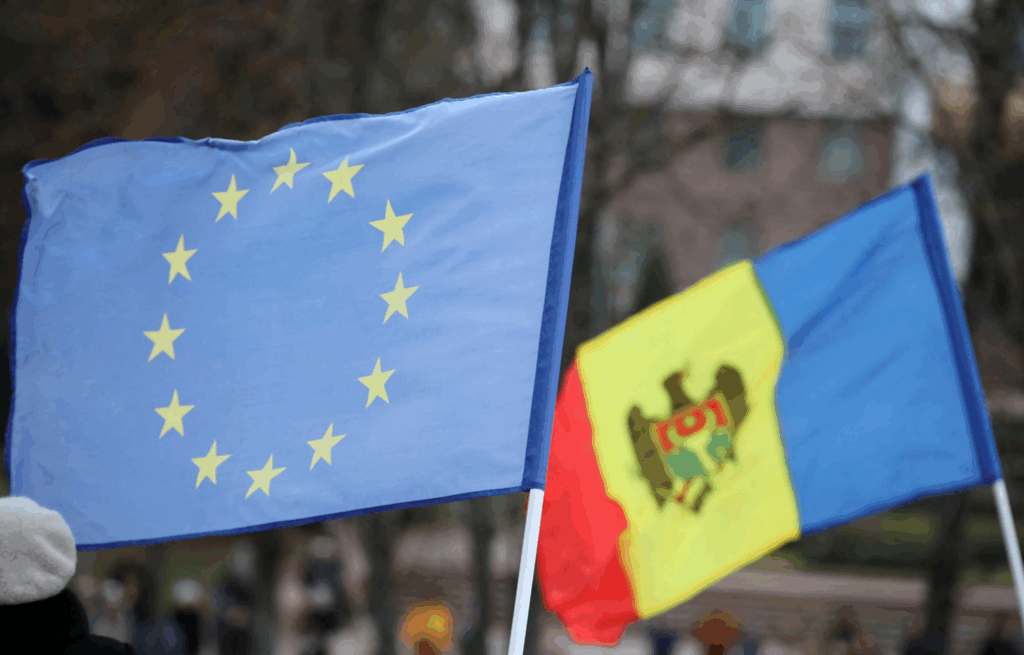A year after President Maia Sandu’s re-election in November 2024—alongside a narrow referendum enshrining EU accession in the constitution—the parliamentary election on 28 September 2025 marks the true test of Moldova’s democratic and European trajectory.
This vote will determine whether a pro European government with mandate for reform can be sustained, thus directly influencing the pace and credibility of EU accession talks launched in mid 2024.
It comes within a context of increasing threats of Russian interference and energy pressures in Transnistria, making it essential for regional stability.
Indeed, Moldova’s upcoming elections will be more than a routine democratic exercise. It will serve as a key moment in EU’s enlargement strategy in the assessment of the stability of potential member candidates.
What began as a European success story with Sandu has become more and more a source of concern for Brussels, with increasing doubts about governance quality and the sustainability of the European course.
Despite being a very small country, Moldova plays an important role due to its strategic location between EU member state Romania and war torn Ukraine. With 2.8 million voters, it has become a geopolitical hotspot.
The country furthermore faces severe demographic challenges: nearly one third of working age adults emigrate annually, and remittances account for about 30 % of GDP. Many citizens hold dual or multiple passports, such as Bulgarian, Romanian, Russian, Ukrainian. This creates a powerful diaspora influence dynamics on Moldovan politics.
Agriculture remains essential for its food security, especially amidst the Ukraine war. In the meantime, the dispute over Russian backed breakaway Transnistria has continued to destabilise internal politics in the country.
Moldova’s elections have long been suspected to be subjected to Russian interference, including allegations of disinformation and cyberattacks aimed at derail its pro-European path.
These external pressures have raised the stakes for democratic strength in Moldova, but it has also introduced lots of complexity. Critics have argued that Sandu, while being justified in dealing with Kremlin influence, has sometimes used concerns about security to justify anti-democratic actions against opposition and media without sufficient transparency.
This has blurred the line between national security and political interests. A debate has emerged over what the right balance between protecting sovereignty while keeping democratic standards should be.
Moldova’s struggle is typical of broader challenges which Eastern Europe faces, where countries must navigate threats of foreign influence, while simultaneously upholding the rule of law. The way in which Moldova balances this will be a crucial test. It will have implications not only for its own EU membership aspirations, but also for the EU’s wider enlargement strategy.
The Sandu project under pressure
President Sandu’s 2020 electoral success and her PAS party’s 2021 parliamentary majority brought in reforms focused on judiciary overhaul, anti corruption, and EU integration.
However, progress has encountered populist resistance and institutional tension. A 2024 EU membership referendum intended to bolster her agenda saw only 44 % turnout, relying heavily on diaspora votes while domestic enthusiasm flagged.
Critics have even warned that Sandu’s governance style exhibits autocratic signs. She is accused of consolidating power, politicising judicial reform, and targeting opponents under the guise of anti corruption—undermining democratic norms, and echoing warnings from the EU about respect for rule of law.
A OSCE election observation from last year flagged notable instances of misuse of administrative resources by Sandu’s camp. This resulted in unequal media coverage, with public broadcaster Teleradio‑Moldova showing bias in her favour.
Meanwhile, in Găgăuzia, fiscal measures and criminal probes against its Bashkan, Evghenia Gutsul, has raised concerns by some about politicised regional control. Sandu’s proposal to personally appoint the Prosecutor General—a move she justified as anti corruption but critics say is politically motivated—has become a flashpoint in the broader debate over judicial independence.
Moldova’s economy is sagging, with rising tariffs, falling wages, and 33.6% of the population living below the poverty line, according to the World Food Programme and the National Bureau of Statistics—developments that have further increased pressure on President Sandu and raised doubts about her administration’s ability to deliver broad-based economic relief.
Meanwhile, some Western allies appear less committed: the US has scaled back certain aid after criticism over USAID spending, and imposed a 31% tariff on Moldovan goods—the highest among post Soviet states.
Implications for EU Enlargement
Moldova’s elections in September will not only shape its domestic path, but also the credibility of the EU’s enlargement strategy.
On the pro-EU side, the newly formed “Alternative” bloc, which was launched in early 2025 by Chișinău mayor Ion Ceban, former prosecutor Alexandr Stoianoglo, ex-prime minister Ion Chicu, and political strategist Mark Tkachuk, positions itself as a social-democratic, anti-corruption force offering a more moderate alternative to President Sandu’s PAS. The bloc has increasingly gained popularity among Moldovan voters.
Meanwhile, the pro Russian left unites around the “For Moldova” alliance (socialists, communists, regional leaders like Irina Vlah), expected to command around 20% of the vote. The “Victory” bloc, supported by fugitive oligarch Ilan Şor, may also stay relevant—though recent CEC data threatens its participation.
The European Union invested heavily in Moldova when it granted candidate status in June 2022, presenting Sandu’s presidency as a democratic success story. But as concerns about government efficiency and democratic compromise emerge in what was previously seen as the EU’s most straightforward accession case, deeper questions emerge about the EU’s own strategic expansion judgment and standards.
A pro-Russian parliament would stall reforms, and halt accession talks. It would weaken the broader Eastern Partnership framework. The stakes are thus high.
Unlike elections in the past in Moldova, which have usually been shaped by a “East vs West” narrative, the 2025 vote is around broader institutional questions about resilience, the rule of law, and the practical benefits of EU integration.
A defeat for PAS would not only end Moldova’s European accession path, but also risk testing Brussels’ ability to work with new countries and adapt to a more pluralist political landscape.
Ultimately, the outcome will speak as much for the EU’s ability to keep its transformative promise, as it does to Moldova. If Moldova loses its EU path, it would have implications across Eastern Europe, and shake the inside of the EU itself.


